Like any other plant, Mango trees have specific nutrient needs to thrive and produce abundant, delicious fruit. Understanding these requirements is crucial for the health and productivity of your Mango trees. Furthermore, fertilizing regularly can improve fruit quality by enhancing coloration, size, sweetness, and juiciness. Well-fed Mango trees tend to produce fruits with better taste profiles as they receive adequate nourishment from the soil.
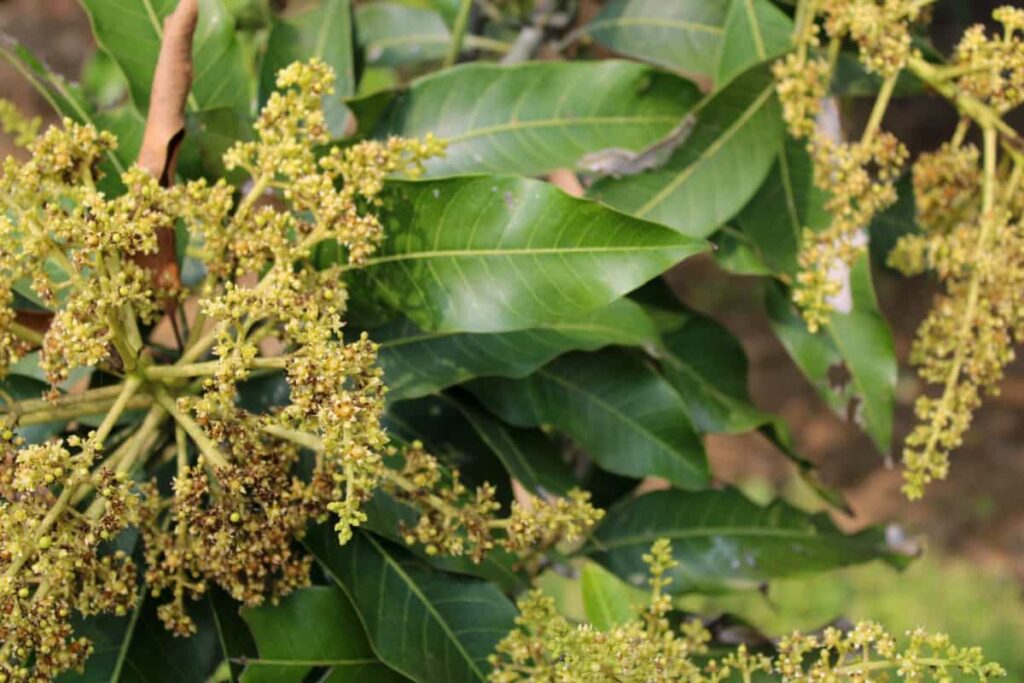
Best Fertilizer for Mango Trees
Organic Fertilizers for Mango Trees
Organic fertilizers are a great choice for nourishing Mango trees naturally and sustainably. One popular option is compost, which is made from decomposed organic matter like kitchen scraps and yard waste. Another organic fertilizer that works wonders for Mango trees is well-rotted manure. This nutrient-rich substance adds valuable organic matter to the soil, enhancing microbial activity and promoting healthy root development.
Animal manure and slurries can also be beneficial as organic fertilizers for Mango trees. They release nitrogen over time slowly, providing a steady supply of this vital nutrient to support growth. A blood meal is another fantastic source of nitrogen that stimulates leafy green growth in Mango trees. Its slow-release properties make it ideal for long-term nutrition.
Natural Fertilizers for Mango Trees
Using bone meal as a natural fertilizer can also benefit Mango trees. It is high in phosphorus, which promotes root development and fruit production in the tree. It can be applied during planting or as a top dressing around established trees. For those looking for a nutrient-rich option, fish emulsion could be an excellent choice for Mango trees.
This liquid fertilizer from fermented fish provides essential macronutrients like nitrogen, phosphorus, and potassium. Seaweed extract offers several benefits for Mango trees as well. It contains trace minerals crucial for plant growth and strengthens their resistance against pests and diseases. Seaweed extract can be applied directly to foliage or added to irrigation water.
Homemade Fertilizers for Mango Trees
One popular homemade fertilizer for Mango trees is coffee grounds. Coffee grounds are nitrogen-rich and essential for promoting leafy growth and plant vigor. Sprinkle the used coffee grounds around the tree base and gently work them into the soil. This will not only help with nutrient uptake but also improve soil structure. Another great option is banana peels. Banana peels contain potassium, phosphorus, and calcium – all important nutrients for Mango trees.
To use banana peels as a fertilizer, chop them into small pieces and bury them near your tree’s root zone. Over time, as they break down, they will release their beneficial nutrients into the soil. Also, Grass clippings can be used as a natural fertilizer for Mango trees. When grass clippings decompose, they release nitrogen into the soil – acting as a slow-release fertilizer source.
Regularly spread thin grass clippings around your tree’s base to avoid creating an overly thick layer that could suffocate the roots. Egg shells can also be utilized as a natural fertilizer for your Mango trees. Egg shells can be crushed and added directly to the soil or compost pile surrounding your Mango trees. It helps prevent blossom end rot in fruits while providing other micronutrients like magnesium.
NPK Ratio for Mango Trees
One key nutrient that Mango trees require is nitrogen (N). Nitrogen plays a vital role in leaf development and overall growth. Lack of nitrogen level can result in stunted growth and yellowing leaves. Phosphorus (P) is another essential nutrient for Mango trees as it promotes strong root development and flowering. Potassium (K) aids fruit production, enhances disease resistance, and improves tree vigor.
In case you missed it: Optimizing Mango Orchard Operations: A Comprehensive Guide for Month-wise Planning
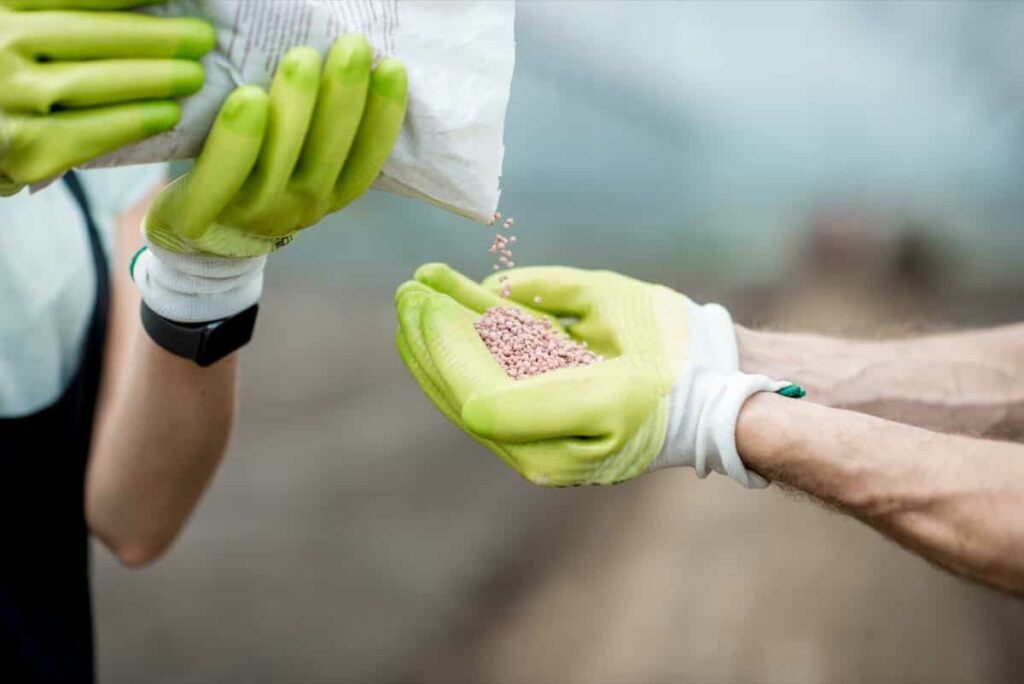
For Mango trees, a balanced NPK ratio is recommended. This means using a fertilizer with equal or close to equal amounts of nitrogen, phosphorous, and potassium. A common example is a 1:1:1 or 1:2:2 ratio formulation like 14-14-14 or 10-20-20 N-P-K. As for the fertilization schedule, applying the fertilizer at specific times throughout the year is important. Generally, it’s best to feed your Mango tree in early spring before new growth starts and again in midsummer after fruit set.
This helps provide continuous nourishment during key stages of its growth cycle. However, depending on location and health conditions, every Mango tree may have different needs. Observing your tree closely and adjusting the timing is always a good idea. The balanced NPK ratio for Mango trees promotes overall healthy growth by providing essential nutrients in appropriate proportions.
Nitrogen aids leaf development and green foliage, while phosphorus supports root development and flower production. Potassium helps with fruiting and overall tree vigor. Using a fertilizer with an appropriate NPK ratio ensures that your Mango trees receive the right balance of nutrients for optimal growth and productivity. Remember to follow recommended application rates based on the size and age of your trees.
Compost Tea for Mango Trees
Compost tea is a nutrient-rich liquid fertilizer that can work wonders for Mango trees. It’s made by steeping compost in water, allowing beneficial microbes and nutrients to be extracted. This natural elixir boosts organic matter and essential minerals, promoting healthy growth and fruit production.
To make compost tea for your Mango trees, fill a bucket with water and add well-aged compost. Let it sit for 24-48 hours to allow the beneficial microorganisms to multiply. Then, strain the mixture using cheesecloth or a fine mesh sieve into another container. For best results, apply every two weeks during the growing season. It helps improve soil structure and moisture retention capacity, creating an ideal environment for root development.
Manure Tea for Mango Trees
Manure tea is a popular natural fertilizer that can benefit Mango trees in many ways. It is made by steeping manure, such as cow or horse manure, in water for an extended period. This process allows the nutrients and beneficial microbes from the manure to leach into the water, creating a nutrient-rich liquid fertilizer. Additionally, manure tea also helps improve soil structure and fertility.
The organic matter in the tea enhances soil moisture retention and promotes microbial activity, leading to better nutrient uptake by Mango tree roots. Place a scoop or two of well-aged animal manure into a cloth bag or mesh container to make your manure tea at home. Submerge this bag in a bucket or barrel filled with water and let it sit for about one week.
In case you missed it: Optimizing Mango Orchard Operations: A Comprehensive Guide for Month-wise Planning
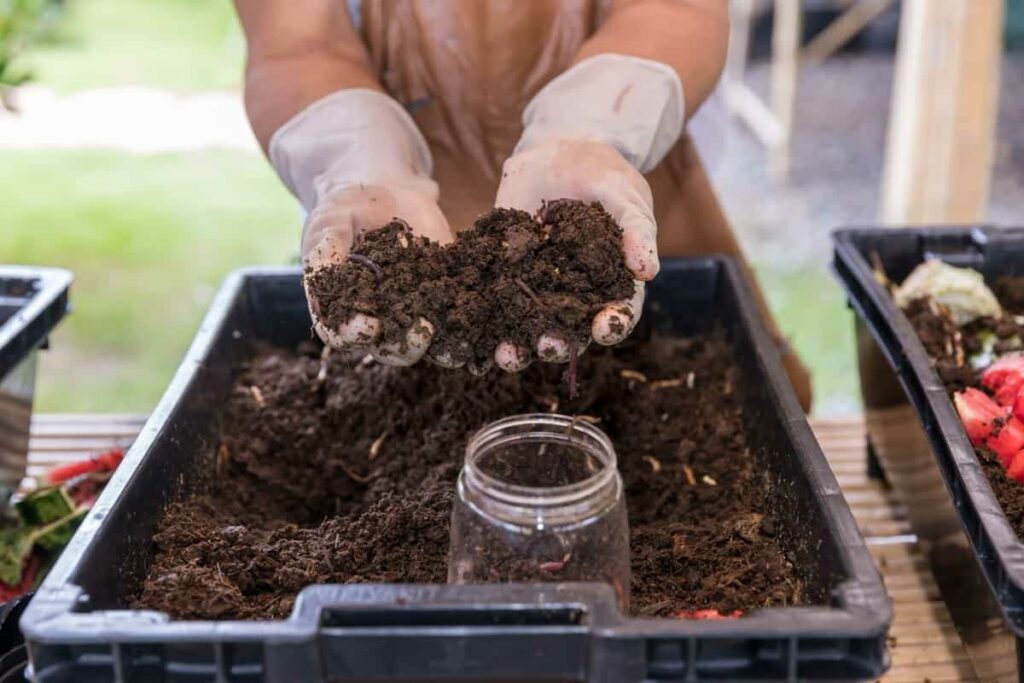
Stir occasionally to aerate the mixture and release more nutrients into the water. When applying manure tea to your Mango trees, dilute it with water at a ratio of 1:10 (one part concentrate to ten parts water). Pour this mixture around the base of each tree while being careful not to splash any onto leaves or fruits as it may cause burns.
Bone Meal for Mango Trees
Bone meal is an excellent natural fertilizer that can provide essential nutrients to Mango trees. It is made from finely ground animal bones, usually sourced from cattle or fish. This organic fertilizer is rich in phosphorus, crucial in promoting root development and fruit production. When applied to the soil around Mango trees, bone meal slowly releases phosphorus over time, ensuring a steady supply of this vital nutrient.
Phosphorus helps strengthen the tree’s roots and enhances its ability to absorb water and other nutrients from the soil. In addition to phosphorus, bone meal also contains calcium, which aids cell growth and overall plant health. To use bone meal as a fertilizer for the Mango tree, sprinkle it evenly around the tree’s base and gently work it into the top layer of soil. Be sure not to apply too much, as excessive amounts may cause nutrient imbalances.
Fish Emulsion for Mango Trees
It is a popular organic fertilizer for Mango trees. It is made from the byproducts of fish processing, such as fish bones and guts. This natural fertilizer is rich in nutrients like nitrogen, phosphorus, and potassium, essential for healthy plant growth. The fish emulsion also contains beneficial microorganisms that promote soil health. To use fish emulsion as a fertilizer for Mango trees, dilute it with water according to the instructions on the product label or follow a recommended recipe. Apply it around the tree’s base or directly onto the foliage during active growing periods.
Seaweed Extract for Mango Trees
Seaweed extract is a fantastic natural fertilizer for Mango trees, packed with essential nutrients and beneficial plant hormones. It is derived from seaweed harvested from the ocean and processed into a concentrated liquid or powder form. Additionally, seaweed extract contains plant growth regulators known as auxins, cytokinins, and gibberellins. These hormones help stimulate root development, improve nutrient uptake efficiency, increase tolerance to environmental stressors like drought or heat, and promote overall plant vigor.
In case you missed it: Key Rules to Grow Organic Mangoes in Uttarpradesh: Varieties, Cultivation Practices, and Production Management
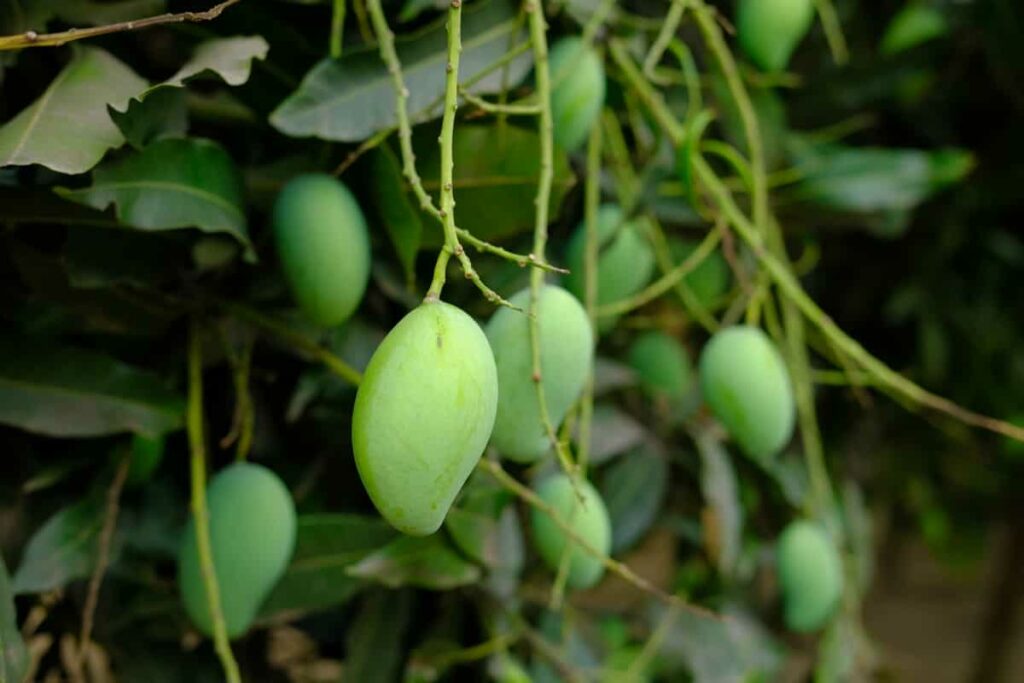
Applying seaweed extract to Mango trees can be done through foliar sprays or soil drenches. Foliar applications allow for direct absorption by the leaves, while soil drenches ensure proper root system absorption. It’s important to note that while seaweed extract provides many benefits to Mango trees, it should not be used as the sole source of fertilization. A well-balanced nutrient program that includes other organic or natural fertilizers will yield optimal results.
Eggshells for Mango Trees
Eggshells are rich in calcium, essential for Mango trees’ healthy growth and development. Calcium helps strengthen cell walls and improves overall plant structure. You can promote stronger stems and branches by providing this vital nutrient to your Mango trees through eggshell fertilizers. In addition to calcium, eggshells contain traces of other minerals like magnesium and potassium.
These nutrients contribute to the overall nutritional needs of Mango trees and help improve their nutrient uptake efficiency. To use eggshells as a fertilizer for Mango trees, crush them into small pieces or grind them into a fine powder. Sprinkle the crushed eggshells around the tree base or mix them into the soil during planting. The slow-release nature of eggshell fertilizers ensures that nutrients are gradually released, nourishing your Mango trees throughout their growing season.
Coffee Grounds for Mango Trees
The main advantage of using coffee grounds as a fertilizer is its high nitrogen content. Nitrogen helps to produce lush green foliage. The acidity level of coffee grounds also aids in maintaining healthy soil pH levels, which Mango trees prefer. To use coffee grounds as a fertilizer for Mango trees, sprinkle them around the base of your Mango tree and gently work them into the soil.
Avoid piling up too much at once, as excessive amounts may increase acidity beyond desirable levels. Besides being a nitrogen source, coffee grounds also contain trace minerals like potassium and phosphorus that benefit plants’ health. Additionally, they act as natural pest deterrents due to their strong smell.
Vegetable Scraps for Mango Trees
Vegetable scraps are great for composting and can be a valuable nutrient source for your Mango trees. Instead of tossing them in the trash or sending them down the garbage disposal, consider using these kitchen leftovers to give your trees a natural boost. When it comes to vegetable scraps, almost anything goes. Carrot tops, celery stalks, lettuce leaves, onion skins – all these bits and pieces can create a nutrient-rich tea that will benefit your Mango trees.
Collect your scraps throughout the week and add them to a water-filled bucket. Let the mixture sit for a few days until it develops a rich, dark color. Once you have your vegetable scrap tea ready, dilute it with water and use it as a fertilizer for your Mango trees. The nutrients from the scraps will help promote healthy growth and increase fruit production. Plus, using vegetable scraps is an eco-friendly way to nourish your plants while reducing waste.
Worm Castings for Mango Trees
Worm castings are essentially the waste produced by worms as they break down organic matter. They are rich in essential nutrients and beneficial microorganisms that promote healthy root development and growth. Mix the worm castings into the soil around the tree’s base or create a worm-casting tea by steeping them in water. Both methods provide slow-release nutrients that nourish your Mango tree over time. One of the great things about using worm castings is that they are completely natural and organic.
In case you missed it: Dashehari Mango Farming in India: Cultivation and Production Practices
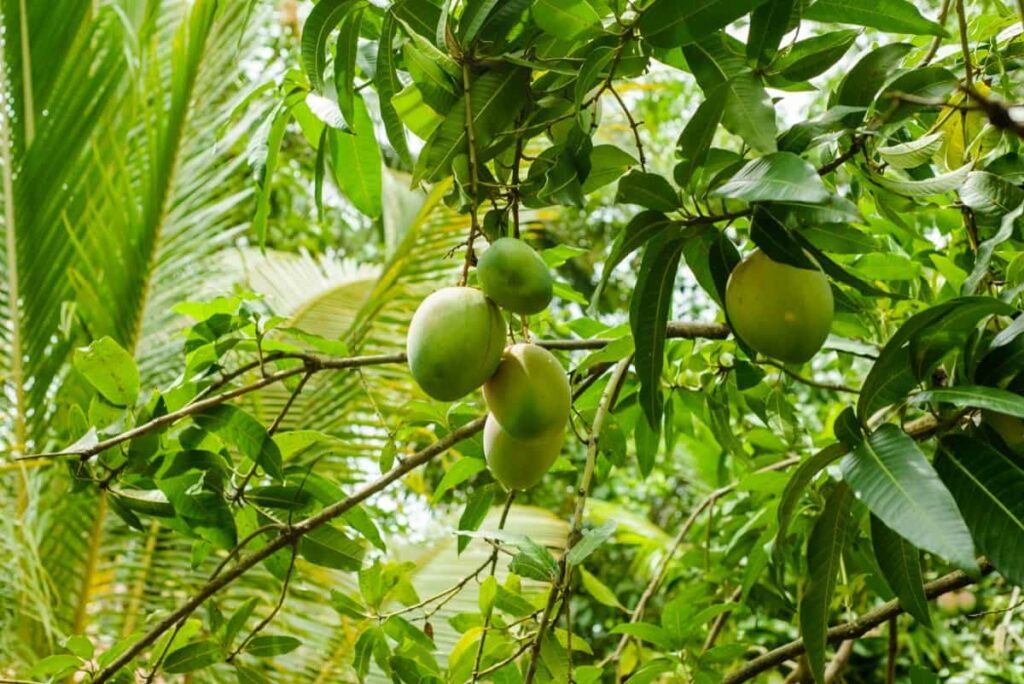
This means you don’t have to worry about harmful chemicals or synthetic additives harming your tree or polluting the environment. Plus, they improve soil structure, making it more fertile and better able to retain moisture. Worm castings contain enzymes and beneficial bacteria that help suppress diseases and pests. So not only will you be providing nutrition for your Mango tree, but you’ll also be creating a healthier growing environment.
Best Fertilize for Mango Trees (Schedule)
| Type of Fertilizer | Fertilizer Options | Best Time to Apply |
| Organic fertilizers | Compost, well-rotted manure, animal manure and slurries, blood meal | Apply them in early spring before new growth starts |
| Homemade fertilizers | Coffee grounds, banana peels, grass clippings, egg shells | Applied throughout the year |
| Natural fertilizers | Bone meal, fish emulsion, and seaweed-based fertilizers | Applied during early spring or late winter when there is no danger of frost |
| NPK ratio | Nitrogen, Phosphorous, Potassium (14-14-14 or 10-20-20) | Applied in late winter or early spring before flowering occurs |
In case you missed it: How to Control Pests and Diseases in Mango: Causes, Symptoms, Chemical, and Biological Management
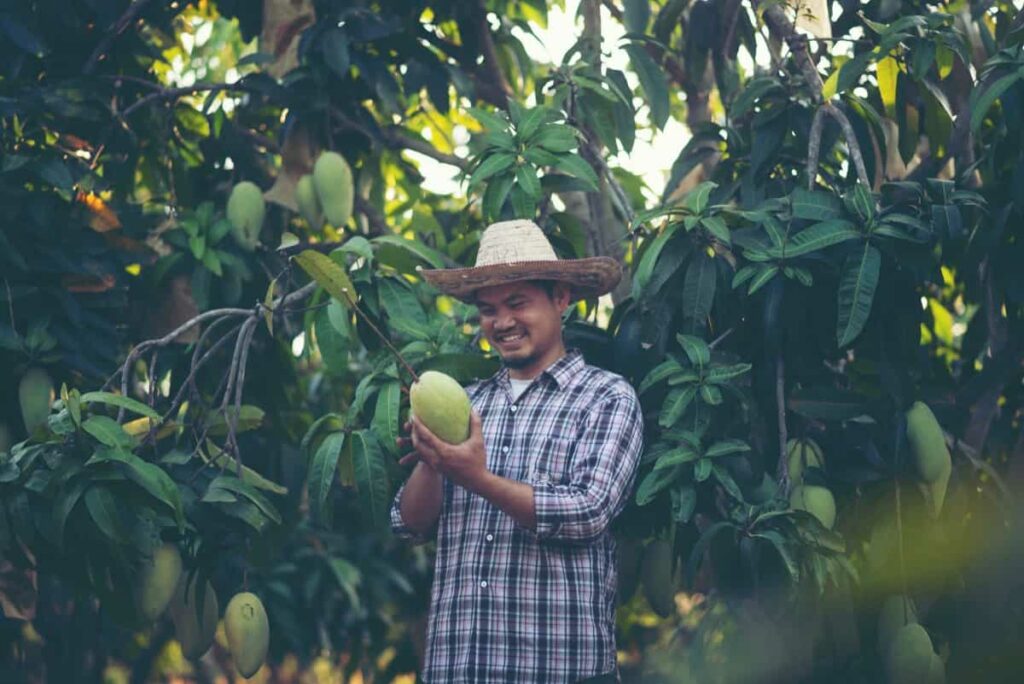
Conclusion
Choosing the best fertilizer for your Mango trees is essential to ensure their health and productivity. Fertilizers play an important role in the growth and development of Mango trees. They provide essential nutrients for healthy foliage, strong roots, and abundant fruit production. Additionally, fertilizing Mango trees encourages higher fruit yields. Balanced nutrition ensures optimal flower formation and pollination, producing an abundance of juicy Mangoes during harvest season.
- Sheep Farming Business Plan for Beginners
- Aquaponic Farming at Home: A Step-By-Step Guide
- Profitable Village Farming Business Ideas in 2024
- High-Yield Aquaculture: Fast-Growing Fish for Farming
- Effective Fish Pond Construction Techniques for Beginners
- Irrigation and Water Management in Pineapple Farming
- Blossom to Harvest: Mastering Flowering and Pollination in Papaya Farming
- Pig Fattening Essentials: From Selection to Sale for Beginners
- Raising Wagyu Cattle: A Complete Guide for Premium Beef Production
- Soil Types and Their Water Holding Capacity
- Optimizing Irrigation Schedules for Coconut Groves for Enhanced Yield
- Espresso Your Garden: Coffee Grounds for Healthier Acid-Loving Plants
- The Best Soil Mix for Snake Plants: How to Mix Your Own Snake Plant Soil
- Green Thumb Success: Expert Tips for Cultivating Greenhouse Beans All Year Round
- Bloom All Year Round: The Ultimate Guide to Indoor Hyacinth Care
- Eco-Friendly Gardening: How to Make Liquid Fertilizer from Kitchen Waste
- Ultimate Guide to Grow Anise in Pots: Explore Seed Propagation to Harvesting
- Guide to Raising Chester White Pigs: Discover Breed Facts to Growth Management
- Mastering the Elegance: The Ultimate Guide to Weeping Cherry Tree Care, Planting, and Maintenance
- Ultimate Guide to Planting Garlic in Grow Bags: Growing Strategies for Beginners
- How to Fix Spider Plant Leaf-Related Problems: Natural and Organic Remedies
- 10 Reasons Why Your Tulsi Plant is Shedding Leaves: Home Remedies and Solutions
- Optimizing Growth and Yield: The Advantages of Palm Bunch Ash Fertilizer
- Utilizing Neem Oil Extract as a Natural Pesticide for Hydrangea
- From Soil to Harvest: Various Ways in Which Farmers Can Use AI Tools
- Steps to Encourage and Induce Citrus Flowers: A Comprehensive Guide
- How to Fix Snake Plant Leaf-Related Issues: Natural and Organic Remedies
- Transform Your Garden into a Fragrant Oasis with Raat Ki Rani (Night Blooming Jasmine)
- Discover the Ideal Chicken Breeds for Philippine Farms
- How to Create a Poultry Egg Farm Business Plan for Profits
- Grow Lemon Cucumbers Like a Pro: Insider Techniques for Bountiful Yields
- Ultimate Guide to Caring for Your Pink Princess Philodendron: Tips for Thriving Variegation
- Areca Nut Profit Per Acre: Calculating Yield and Cost of Cultivation
- How Kaveri Chicken is Becoming a More Profitable Breed in Indian Backyards
- Transform Your Barn: 9 Steps to Convert a Horse Stall into a Chicken Coop
- Exploring Suffolk Sheep Disadvantages with Limitations and Challenges
